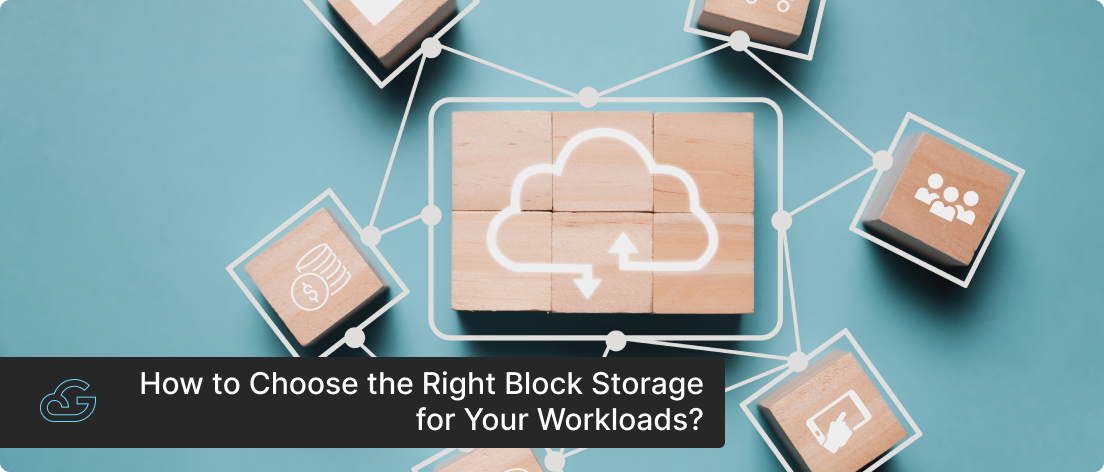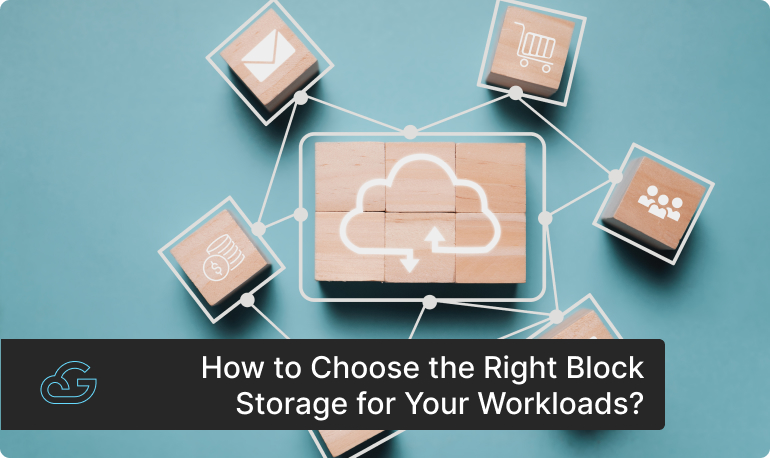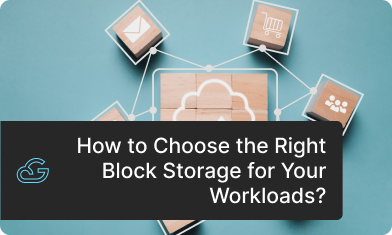Blogs / Block Storage
How to Choose the Right Block Storage for Your Workloads?
By
Raj Mathew
Posted: January 22, 2024
• 6 minutes, 40 seconds
According to Statista, the total volume of data created, captured, and consumed globally will go beyond 180 zettabytes by 2025. In the face of this data explosion, the conventional approach of managing on-premise storage servers is slowly becoming impractical and tedious. To overcome this challenge, many companies are adopting cloud storage solutions.
AWS defines cloud storage as a cloud computing model that enables data storage on the internet, eliminating the need for buying and managing an on-premise infrastructure. This results in numerous benefits, such as cost-effectiveness, enhanced agility, streamlined data management, and more.
There are three main types of cloud storage available in the market—object, file, and block—each with its own unique set of advantages and use cases. In this blog post, we will explain the concept of “cloud-based block storage” while analyzing all its essential characteristics comprehensively to help you pick the right storage system for your workload.
So, let’s start by explaining what cloud block storage is.
What is Cloud Block Storage?
Block storage is a storage system in which the data is divided into fixed-size blocks and stored individually. Each block has a unique identifier and can be stored in different environments, allowing the user to retrieve it quickly. For enterprise applications that demand high Input/Output Operations Per Second and low latency, block storage is the ideal choice.
Traditionally, block storage is associated with on-premise storage solutions, such as physical hard drives, storage area networks (SANs), or network-attached storage (NAS) devices within an organization’s data center. However, cloud block storage is part of the cloud computing infrastructure as a service (IaaS) offering.
Compared to the on-premise model, cloud block storage offers numerous benefits such as scalability, accessibility, cost-efficiency, etc. For instance, scaling up an on-premise block storage system will involve adding physical hardware or upgrading the existing infrastructure, which will be time-consuming and expensive.
On the other hand, with cloud block storage, the cloud service provider provisions the scaling of storage capacity while users can focus on other tasks. There are numerous cloud block storage solutions available in the market. Major cloud service providers—AWS, Azure, and GCP—offer block storage solutions tailored to diverse scenarios and use cases. Let’s go over some of the most prominent and commonly used storage solutions from them.
Different Types of Cloud Block Storage
- Elastic Block Storage (EBS) in AWS:
- Azure Managed Disks:
- Google Cloud Persistent Disk:
EBS is the most popular and high-performing block storage solution from AWS. It provides persistent, block-level storage volumes for Amazon Elastic Cloud Compute (EC2) instances. Due to its durability and scalability, EBS can be used with a wide range of workloads. EBS offers a variety of volume types, such as General Purpose SSD, Provisioned IOPS SSD, Throughput Optimized HDD, Cold HDD, and Magnetic.
Azure Managed Disks provide durable and highly available block-level storage that can be attached to Azure virtual machines. By simplifying the process of creating and managing storage disks, they allow the user to focus on other critical tasks. Different types of Azure Managed Disks are Ultra Disks, Premium SSD, Standard SSD, and Standard HDD.
Google Cloud Persistent Disk is a block storage solution designed to be used with Google Cloud Compute Engine instances. Coming with top-notch durability, advanced encryption, and other performance features, Persistent Disks can be used for several mission-critical use cases. Different types of Google Cloud Persistent Disk are Standard Persistent Disks (HDD), Balanced Persistent Disks (SSD), Performance Persistent Disks (SSD), Extreme Persistent Disks (SSD), and Local SSDs.
Now that we have enough information on the different types of block storage solutions offered by major cloud service providers, let’s move on to the next section—common use cases for cloud block storage.
Common Use Cases for Cloud Block Storage
Due to their versatility, scalability, and performance attributes, cloud block storage systems are suitable for a wide range of use cases. Let’s list down some of the most popular use cases where cloud block storage is particularly beneficial.
- Database Storage – Cloud block storage ensures optimal database performance with low latency and high throughput.
- Business Critical Applications – Cloud block storage caters to the performance demands of enterprise applications like ERP platforms or CRM systems.
- Big Data Analytics – Cloud block storage provides high throughput data transfer, which is vital for real-time analysis in big data platforms.
- Content Delivery – Cloud block storage enhances user experience by reducing latency for multimedia content.
- Containerized Applications – Cloud block storage offers flexible support for containerized applications.
- Backup & Disaster Recovery – Cloud block storage facilitates swift data recovery for enabling business continuity.
These different scenarios and use cases emphasize the adaptability of cloud block storage systems. However, choosing the right cloud block storage requires a more detailed assessment of factors, such as workload performance requirements, costing, data security, backup etc., all of which need to be aligned with the overall business objectives. Let’s go over each of these factors in the next section.
You May Also Like: How Can Cloud Block Storage Help Streamline Data Operations?
Key Factors to Consider When Selecting Cloud Block Storage for Your Workload
- Latency:
- Throughput:
- Durability:
- Availability:
- Snapshot & Backup Capabilities:
- Data Encryption & Security:
- Compatibility:
Often measured in milliseconds, latency represents the time taken for data to travel between the storage system and the application. Reduced latency ensures a more responsive and efficient user experience, making it an important characteristic to consider while selecting a cloud-based block storage. For instance, if the workload involves real-time processing scenarios, such as databases, latency is the primary factor that users must examine.
The next factor that users must evaluate before selecting a cloud-based block storage is throughput. Measured in megabytes or gigabytes per second, it indicates the amount of data transferred between the storage system and the application. High throughput in storage systems guarantees smooth data transfer, minimizing delays and delivering optimal performance. For example, in scenarios or workloads involving content streaming or data analytics, users must opt for cloud block storage with high throughput.
Durability refers to the ability of a storage system to preserve data over time. Highly durable storage makes sure that data remains intact and accessible even during system errors, hardware malfunction, and other unforeseen events. This feature is essential for maintaining data integrity, reliability, and consistency, making durability an important factor to consider while selecting a cloud block storage.
Another key factor that users must consider while choosing cloud block storage for a workload is availability. Also known as “uptime”, it denotes the percentage of time a storage system remains accessible and operational. In workloads that involve continuous access to data, availability is highly critical for ensuring uninterrupted service.
Snapshot and backup capabilities involve the ability to take snapshots of data at a particular point in time and implement robust backup strategies. These features are vital for ensuring data recovery and business continuity. Snapshots provide a way to capture data at specific moments, facilitating recovery to a known state, while regular backups safeguard against data loss due to various factors, including accidental deletion, hardware failures, or cyber threats.
Data encryption and security measures are important aspects to consider while identifying the right cloud block storage. With advanced data encryption, the storage system can make sure that the data is securely stored and transmitted. Security features like access control and authentication add further layers of protection, ensuring regulatory compliance while fortifying the system’s defense against potential security breaches and unauthorized access.
The final factor that users must consider before selecting cloud-based block storage is compatibility. Users must carefully assess if the selected storage system is compatible with the current technology stack, operating systems, and applications, ensuring seamless data transfer and interoperability. Evaluating compatibility beforehand will help companies mitigate the risk of potential integration challenges while enabling a smooth transition to cloud block storage.
Optimize Data Storage and Management with Gsoft Cloud's Block Storage Solutions
At Gsoft Cloud, we specialize in delivering data storage solutions designed to be fast, secure, and scalable, catering to businesses of all sizes. Our block storage solutions feature advanced data security, high performance, flexible configuration, and robust disaster recovery mechanisms, empowering organizations to achieve long-term growth and unleash innovations.
Key features of Gsoft Cloud’s Block Storage Solutions are:
- Flexibility & Scalability: Customize your storage capacity according to your business needs.
- High-Speed Data Access: Experience rapid access to your enterprise data for optimal performance.
- High Data Availability: Ensure your data is constantly accessible for uninterrupted operations.
- Secure Data Storage: Trust our advanced security measures for the protection of your valuable business data.
- Cost-Effective Implementation: Leverage our storage solutions without compromising on your overall budget.
Summary
The cloud is evolving into an indispensable element of the modern-day organizational tech stack. As digital transformation gains significant momentum, cloud and cloud block storage solutions are poised to be the critical enablers for long-term success. However, choosing the right cloud block storage solution requires extensive knowledge about cloud computing and different storage types.
For expert guidance, reach out to us at www.gsoftcomm.net, and our team will help you identify the right cloud block storage solution for your workload.


Get Know More About Our Services and Products
Reach to us if you have any queries on any of our products or Services.










